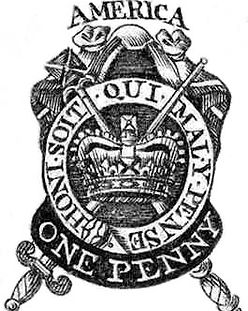
Author: Kevin Daley
History According To Kevin Daley
The Stamp Act
Background
At the conclusion of the French and Indian War, the British were in debt over their heads, and only the Americans were to blame. Intended to be the empire’s most promising sources of revenue, the colonies had just dragged England into an unwanted war, and the Empire was not happy about it (Brinkley 96). This is one reason why, perhaps, Parliament began to impose several unfavorable “Acts” upon the Americans in the coming years. Among these acts, the most prominent is what is known as the Stamp Act, a piece of legislature that called for a tax on every paper product sold in the colonies (Kupperberg 37-38).
Colonial Reception
The colonists, particularly merchants and the middle class, were outraged by the Stamp Act, and as British citizens, felt betrayed by their nation. The act made it very clear to the Americans that Britain did not regard them as highly as they would have hoped, and that the colonies were just another asset of the Empire to be used to England’s advantage. The Stamp Act, unlike other taxes, was an obvious attempt to override colonial self-government, and increase the monarch’s share of New World wealth (Brinkley 101).
This act was the last straw for some, and in response, the radical group known as the Sons of Liberty was formed. The new group went about rioting, harassing stamp agents, and burning stamps in hopes of forcing the government to repeal the act (Brinkley 102). Other, more peaceful (and more effective) reactions to the act also occurred; the colonies united under their common burden, and participated in a shared boycott of British goods altogether (Kupperberg 39). In the Virginia House of Burgesses, Patrick Henry conceived the “Virginia Resolves” a set of statements of colonists’ rights as British citizens, most importantly the right to only be taxed by local representatives. The act also spurred the first inter-colonial collaboration, the Stamp Act Congress. Nine of the thirteen colonies sent delegates to the meeting, and the group affirmed a similar truth to that expressed by Henry in Virginia, the colonies demanded a parliamentary representative (Brinkley 102).
Conclusion
The boycott took a heavy toll upon the British economy, and only months after its initial enactment on November 1, 1765, it was repealed in March 1766 (Kupperberg 39). Though the colonists got what they wanted, tension and distrust only grew between them and Britain. This also marked the first time the colonies had worked together as a success, and planted a concept in American minds that would recur in only a few short years.



Works Cited
1. Kupperberg, Paul. A Primary Source History of the Colony of New York. New York: Rosen Central Primary Source, 2006. Print.
2. Brinkley, Alan. The Unfinished Nation: A Concise History of the American People. Boston: McGraw-Hill, 2004. Print.
Pictures
1. http://www.landofthebrave.info/images/1765_one_penny_stamp.jpg
2. http://images.rapgenius.com/7f13ae7f86e525ce230ce35cc308ea00.582x401x1.jpg
3. http://www.indiana.edu/~liblilly/history/images/thumbnails/e215-2-g68_00001.jpg